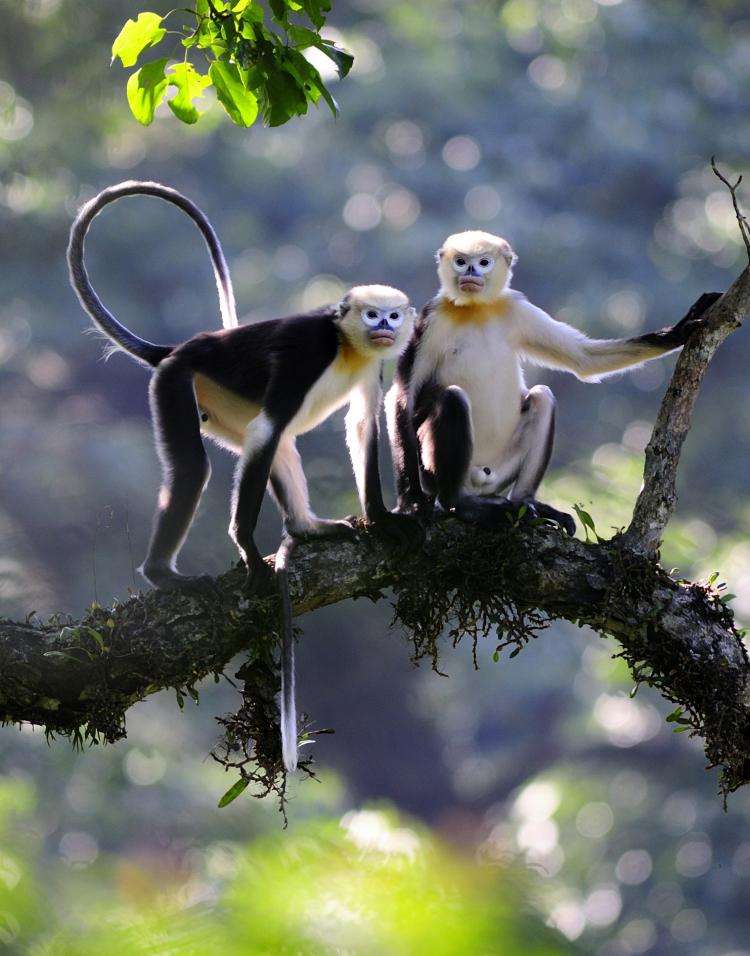Anthropology professor helps create conservation program in Vietnam
The plan is the result of years of work by Vietnamese conservationists and CU Boulder's Herbert Covert, who helped lay the groundwork for the project
A cohesive conservation plan protecting the Vietnamese environment—and primates—is now signed legislation, in part due to efforts of a University of Colorado Boulder anthropologist.
The plan, which was approved by the country’s prime minister last May, aims to expand protected forests, increasing habitat for primates.

Tonkin snub-nosed monkeys in Vietnam. Photo by Le Khac Quyet. At top of the page is an image of a red-shanked douc. Photo by Herbert Covert.
Worldwide, 75 percent of the world’s primate populations are in decline, while 60 percent are threatened with extinction, according to a study published in Science Advances last year. In Vietnam, 88 percent of primates are threatened with extinction.
A journal article titled “Primates of Vietnam: Conservation in a Rapidly Developing Country,” published in Anthropology Now in September, details the causes of environmental degradation in Vietnam, and future challenges and practices used to combat the rapidly declining populations of primates—including the new conservation plan.
The plan “actually relates to quality of life and livelihoods of future generations,” said Herbert Covert, a professor of anthropology at CU Boulder’s College of Arts and Sciences.
This plan is the result of years of work by Vietnamese conservationists and Covert, who helped lay the groundwork for the project.
Covert understands the issues Vietnamese conservationists face because he has worked in conservation for nearly two decades, conducting comprehensive research on primates.
The conservation plan—effective until 2025 with a possible extension to 2030—is partially funded by the Vietnamese government, and will incorporate stakeholders to help protect and monitor the primates in these areas and will also support a number of primate-rehabilitation centers.
The plan also aims to reduce gun possession in residential areas near primates’ habitat in an effort to reduce hunting by 70 percent. Schools will include biodiversity conservation in their curricula, and law enforcement will patrol sensitive areas.
Previous conservation plans in Vietnam have been unenforced, according to Covert.
Covert learned about the plight of conservation in the country in the late 1990s when he was giving an academic lecture in Vietnam and a local expert—Ha Dinh Duc—rose and began speaking loudly and forcefully hitting his hand on a table for emphasis.
“In Vietnam, it is considered to be rude to speak loud or be demonstrative like that, but Professor Ha Dinh Duc was making a point,” Covert stated.
“Initially I was nervous that the point he was making was that this man from the United States doesn’t know what he’s talking about.”
However, Duc supported Covert; he argued that his country’s attempts to conserve primates were failing.
Covert gave his business card to everybody in the classroom, and a student named Nguyen Manh Hiep contacted him. This relationship lasted years, with Covert remaining in regular contact. He even attended Hiep’s wedding.

Herbert Covert
Hiep went to work for the Vietnam Ministry of Forests, but such networking brought more young Vietnamese scientists to Covert, such as Le Khac Quyet—who later received a PhD from CU Boulder in 2014.
While Quyet had been involved with conservation in Vietnam since the early part of this century, after earning his PhD, Quyet has become a leader of this cause. In addition to collaborating on the national level conservation action plan with Hiep and others, Quyet and Covert continue their work on the ecology of the Tonkin snub-nosed monkey.
Covert and a team of international colleagues emphasized the importance of encouraging the Vietnamese people to assume responsibility for the country’s environment and animals.
“We constantly talked about Vietnamese taking leadership. We cannot simply settle for just protecting these beautiful animals,” Covert said, showing pictures of the red-shanked douc and Tonkin snub nosed monkey. “And they are beautiful animals.”
Vietnam faces a host of ecological challenges— from the building of roads and dams, to mining, tourism and hunting—that all diminish primate habitat and population.
Additionally, Vietnam suffered significant environmental damage during several wars.
During the Vietnam War, or what the Vietnamese call the American war. Covert stated, “Vietnam became the most heavily bombed area of the world in the history of all military conflicts.”
The use of defoliants during the Vietnamese-American war killed much biodiversity and stunted forests, Covert observed. “You can still see areas that seem to be decent looking forest, but really they not native forests; they are invasive series species which can deal with the dioxins.”
But, with the growing cadre of well trained and dedicated Vietnamese conservation biologists, and the support of the government as reflected in the national level primate conservation plan, Covert is optimistic that the endangered primates of Vietnam will be protected.

